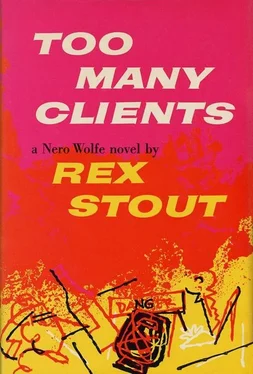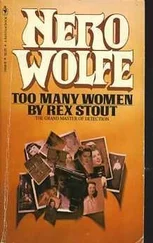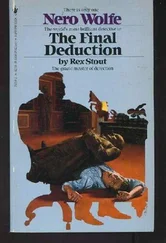Aiken snorted. “You don’t have to persuade us that Miss McGee didn’t kill the girl. Or Yeager.”
Wolfe turned to him. “I am describing my progress to my conclusion. It is apparent that Miss Perez had assembled, and was keeping hidden, a complete record of her discoveries regarding Mr. Yeager and the visitors to that room. It is certain that she knew the name of the person whom she saw in the hall between seven and nine Sunday evening, since she was able to reach him, to confront him with her knowledge and her threat. Therefore it was a sound assumption that this collection contained an item or items on which her identification of that person was based.”
He pointed to the tassels. “Two such items are there: the pictures of Mr. Yeager’s wife and son, with their names. I rejected them because they did not meet the specifications. The person who went there Sunday evening with a gun and shot Yeager with it must have had keys and known how to use them, and he must have known that Miss McGee intended to arrive at nine o’clock, since otherwise he could not have expected to find Yeager alone. It was conceivable that either the wife or son met those requirements, but it was highly improbable.”
He picked up the remaining item. “Adopting that reasoning, at least tentatively, I was left with this. This is a picture, reproduced in a magazine, of a gathering in the ballroom of the Churchill Hotel, a banquet of the National Plastics Association. Mr. Yeager is at the microphone. The caption gives the names of the men on the dais with him, including you. No doubt you are familiar with the picture?”
“Yes. I have it framed on the wall of my office.”
“Well.” Wolfe dropped it on his desk. “I asked myself, what if it was you whom Miss Perez saw in the hall on your way to the elevator Sunday evening between seven and nine? What if, having this picture in her collection, she recognized you? What if, later, having learned that Yeager had been killed up in that room — for she must have seen her father and mother transporting the body — she guessed that you had killed him, decided to make you pay for her silence, communicated with you, made an appointment to meet you, and kept it? You will concede that those were permissible questions.”
“Permissible? Yes.” Aiken was disdainful. “You don’t need permission to ask preposterous questions.”
Wolfe nodded. “Of course that was the point. Were they preposterous? To answer that, further questions had to be asked. One, could you have had keys? Two, could you have known Yeager would be there alone? Three, had you a motive?”
Wolfe stuck a finger up. “One. You could have borrowed Miss McGee’s keys, but if so you would have had to return them to her before nine o’clock so she could let herself in. That did seem preposterous, that you would return the borrowed keys so she could enter, find Yeager’s body, and inevitably assume that you had killed him. Not tenable.”
“Do you expect me to sit here and listen to this nonsense?”
“I do. We have arrived at the urgency and you know it.” Another finger up. “Two. Yes. You could have known Yeager would be there alone. Miss McGee says she told no one of her nine o’clock appointment, but that was to be expected if it was you she told.” Another finger. “Three. When I first asked that question, had you a motive, I knew nothing about it, but I do now. Yesterday I made some inquiries on the telephone — I assure you they were discreet — and last evening Mrs. Yeager sat for an hour in the chair you now occupy and gave me many details. For five years, since he became executive vice-president, Yeager has been a threat to your leadership of the corporation, and in the last year the threat has become ominous and imminent. The best you could expect was that you would be made chairman of the board, removed from active control, and even that was doubtful. Since you had dominated the corporation’s affairs for more than ten years, that prospect was intolerable. You can’t very well challenge this, since the situation is known to many people.”
Wolfe’s fingers came down, and his hand dropped to the desk. “But what chiefly concerned me when you and Miss McGee left this room twenty-four hours ago was not your motive; a motive, however deeply hidden, can be exposed. The problem was the keys, and there was an obvious possibility, that you had borrowed Miss McGee’s keys, not last Sunday, but at some previous date, had had duplicates made, and had returned them to her. Testing that possibility would have been hopeless if they had been ordinary keys, but Rabsons are peculiar and there aren’t many of them. I decided to try. I sent for three men who help me on occasion and gave them this picture and the keys I got from Miss McGee yesterday. They had copies made of the picture and duplicates of the keys, and returned these to me. They were to start with the locksmiths nearest your home and office. Only a little more than an hour ago, just before I phoned you, one of them, Mr. Saul Panzer, turned the possibility into a fact. This is of course the crux of my report.” He pushed a button on his desk. “This begot the urgency.”
His eyes went to the door, and Saul appeared with Arthur Wenger. They came to the front of Wolfe’s desk and turned to face Aiken. Wolfe said to Aiken, “This is Mr. Arthur Wenger. Do you recognize him?”
Aiken was staring at Wenger. He moved the stare to Wolfe. “No,” he said. “I’ve never seen him.”
“Mr. Wenger, this is Mr. Benedict Aiken. Do you recognize him?”
The locksmith nodded. “I recognized him from the picture. It’s him all right.”
“Where and when have you seen him before?”
“He came to my shop one day last week with a couple of Rabson keys to get duplicates made. He waited while I made them. I think it was Wednesday, but it could have been Tuesday. He’s a liar when he says he’s never seen me.”
“How sure are you?”
“I couldn’t be any surer. People are like keys; they’re a lot alike but they’re all different. I don’t know faces as well as I know keys, but well enough. I look at keys and I look at faces.”
“It’s an excellent habit. That’s all now, sir, but I’ll appreciate it if you can spare another hour.”
“I said I could.”
“I know. I appreciate it.”
Saul touched Wenger’s arm, and they went. In the hall they turned left, toward the kitchen. Soon after Saul had phoned, Fritz had got started on a chicken pie with forcemeat and truffles for their lunch, and it would soon be ready.
Wolfe leaned back, cupped his hands over the ends of the chair arms, and spoke. “Miss McGee. Manifestly Mr. Aiken is doomed. You shifted your loyalty from Mr. Yeager to him; now you must shift it from him to yourself. You’re in a pickle. If he is put on trial you’ll be a witness. If you testify under oath that you did not lend him your keys and that you didn’t tell him you would arrive at that house at nine o’clock Sunday evening you will be committing perjury, and it may be provable. More and worse: You may be charged as an accessory to murder. You lent him the keys, he had duplicates made, and he used the duplicates to enter a house to kill a man. You made it possible for him to enter the house without hazard, ensuring that Yeager would be alone, by arranging a nine-o’clock assignation—”
“I didn’t arrange it!” Too loud again. “Nine o’clock was the usual time! And I only told Mr. Aiken because—”
“Hold your tongue!” Aiken was on his feet, confronting her. “He tricked you once and he’s trying it again. We’re going. I’m going, and you’re going with me!”
I was up. If she had left her chair I would have moved between them and the door, but she stayed put. She tilted her head back to look up at him, and I have never seen a stonier face. “You’re a fool,” she said. I have never heard a harder voice. “A bungling old fool. I suspected you had killed him but I didn’t want to believe it. If you had had any brains — don’t stand there glaring at me!” He was in front of her, and she moved her chair to send her eyes to Wolfe. “Yes, he borrowed my keys. He said he wanted to see the room. He had them two days. And I told him I was going there Sunday night at nine o’clock. I had promised to keep him informed. Informed! I was a fool too.” Her voice stayed hard but it was also bitter. “God, what a fool.”
Читать дальше












